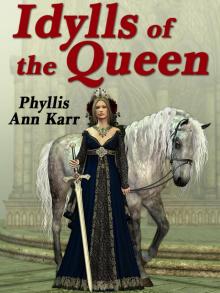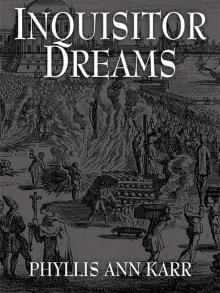- Home
- Phyllis Ann Karr
The Idylls of the Queen Page 3
The Idylls of the Queen Read online
Page 3
“Then Le Fay missed her chance, didn’t she? If the stuff had been on the skin of the fruit, it would have gotten onto the Queen’s fingers and then into her own mouth with her other food.” I threw that thought away from my mind as soon as it was spoken. “A long pin,” I went on, “dipped in poison, then inserted through the blossom end or maybe the stem end, slantwise into the meat.”
“You seem to understand the process very neatly, Sir Seneschal. Then I will find a way to poison apples without necromancy, too. Suppose they were buried in venomed earth last harvest? Suppose the venom had all the winter to penetrate each piece to the core?”
“Without tainting the peel?”
“Any surface taint would be cleaned off with the dirt when the fruit was dug up. The peel would be left harmful only to the tongue, not to the fingers. And the poison would remain within. You are in charge of seeing the fruit stored each harvest, are you not, Sir Kay?”
“Yes, I am! In whatever place the court happens to be at harvest time. And yes, we were here in London last harvest. But I don’t always watch every apple buried individually, and I don’t always stand over the servants and order them exactly which pit or bag or tub to go to for the food—or were you aware of that, Dame Cupbearer? This court has made progress through eight different cities since the storerooms were filled here in London last fall, and I go with the court—or had you forgotten that? By God, my lady, when I start poisoning people, I’ll know who I’m—”
“You will hardly need any other poison, Sir Seneschal, while you have your tongue!” She stood up. “The earth might have been tainted by a serpent, or by water from a serpent-venomed spring. Such things have happened before now. But since you have chosen to defend yourself where there was no accusation—”
“No accusation!” I was on my feet now, too. “And you call my tongue poisonous? What reason would I have—”
“Jealousy!”
“Jealousy? Jealousy, in God’s Name?”
“Aye, jealousy, Sir Seneschal! You are more jealous of Her Grace and Lancelot than that pitiful fool Meliagrant ever was! Do you think, because the King does not see it, no one else does?”
I don’t know whether Dame Lore left then because of her own rage or because of something she saw in my expression. If a tenth of what my soul felt was leaking through into my face, I must have looked fierce enough to give an ogre pause.
I stood there watching her absence until I could be reasonably sure she was not coming back again. Then I sat and stared at the begrimed silver fruitbowl lying sunk in the embers.
Dame Lore was wrong. I am not jealous of Lancelot. You can only feel jealousy toward someone for whom you have some kind of respect or affection. Jealousy is what I feel towards Gawain. What I feel towards Lancelot is something only the demons in Hell can have a name for, something that should probably frighten me about my eternal salvation, if Lancelot did not deserve every breath of it.
Who should be the King’s right hand? Kay, his foster-brother, his seneschal, the man who was raised with him, shared his training (a few years in advance of Artus, too, and for every time I may have played the bully, I smoothed out the way several times for him). Who was, in fact, recognized as Arthur’s right hand? Lancelot. And Gawain.
Gawain I can stomach. He is the King’s sister’s son, and not only is his loyalty above question, but he is usually at hand when needed. When he goes out on quest or mission, he lets it be known in advance. When he aims to kill, he has a reason, he makes sure his opponent is equally armed, and he knows what he’s doing. When Gawain’s father rebelled against Arthur, Gawain came, along with his mother Morgawse and those of his brothers who were old enough, to our side. The decision could not have been easy, especially for a man of Gawain’s scruples and family feeling.
If Lancelot had any deep, noble reason in coming across the Channel to Arthur, aside from personal glory-seeking, he kept it well concealed. He came, was dubbed knight, and left again immediately for his independent adventuring. Lancelot made sure everyone knew what a great warrior he was before he deigned attach himself permanently to Arthur’s court. If you can call it permanently when every second or third year he either slips away to go adventuring on his own again, without warning anyone beforehand, or goes out of his mind and runs amok for a year or three. And when Lancelot goes battle-berserk, in or out of a legitimate battle situation, even his friends and kinsmen had better keep out of his way.
We all know what a marvelous man of his arms is Lancelot of the Lake. He goes to any lengths to hammer it home to the world. There was the time he and I spent the night at the same forester’s lodging. Lancelot got up before dawn, put on my armor and shield, and rode off while I was still asleep, so that he would have the chance to increase his glory by striking down all the knights who would not have attacked Lancelot but were willing enough to attack a man they thought was Kay. If I had had my good charger Feuillemorte at the time, Lancelot would probably have “borrowed” him, too. Oh, I got back to court in perfect safety. I had no shield but Lancelot’s, and his reputation was already such that no one was willing to fight him in love or lightness. For which safety I was expected to be duly grateful to the generosity of the great hero. But any chance I might have had to win a little honor in my own name was gone. One of the few times I have ever been able to leave court for a few fortnights’ adventuring on my own, wasted.
Artus may have been the only man to unite Logris, at least as well as it can ever be united. No one denies he is a fine leader in war. When he sits in judgment, so long as he is not personally involved in the case, he was a way of cutting through forms and trivialities, getting to the heart of the matter, and making a decision that endears him to the people. His knights love him because he still ventures his body on the same terms as the rest of us, in an occasional tournament as well as in battle; I suppose the popularity is worth the risk of having a dead or maimed High King and no heir ready. But as for the regular, day-to-day functioning of his kingdom and court, the kingdom runs by the Queen’s efforts and the court by my own. Nobody realizes how much. Along with my other duties, I serve as scapegoat for anything that might otherwise dent Arthur’s popularity—even Arthur does not quite understand that service. Folk should at least remember what happened in this kingdom when Guenevere’s look-alike seduced Arthur and supplanted the true Queen for two years: The country came near to rotting away, and not even the Pope’s interdict brought Artus back to his senses. Only the false queen’s dying confession woke him up; the kingdom started to recover only when Dame Guenevere agreed to leave her sanctuary in Surluse and come back to her first husband. Maybe the common people remember that interlude more clearly than they are willing to say. I am not sure.
Arthur had been ready to sentence Her Grace to death when he named her look-alike queen. He had been ready to have her hair torn out and the skin peeled from her loving face and gentle hands. If he had done it, I could not have remained loyal to him. I would have given my life to save Dame Guenevere, but Lancelot took it as his natural right to act as her champion. Again. And afterwards escorted her into Surluse to share her banishment while his liege lord played with the look-alike.
I probably owe my own life to the conceited Mirror of All Knightly Prowess. The time Bagdemagus’ worthless son Meliagrant accused Her Grace of infidelity, I was the supposed lover he named. I was newly wounded, and there was blood in her bed. There was also blood on the bars of the window, if anyone else noticed it besides myself, and Lancelot answered Meliagrant’s challenge with bandaged hands, insisting, as usual, that he and no one else should fight as the Queen’s champion. No matter that I had not asked him to clear my name as well as hers—no matter that I was more than willing to have fought Meliagrant myself as soon as I was sufficiently healed to sit my horse—no matter, even, that there was not that much glory in defeating Meliagrant, and Lancelot had to fight with his head and half his body unarmored and his left arm bound in order to win any fresh fame for the encounter.
>
It was more important to clear Her Grace than to quibble about who the man might have been. But, God! That he should have fought to clear me of his own deed—that he should have loved the Queen in my place!
Even remembering it, I threw the nearest goblet against the wall, denting it beyond use. No matter, I would pay for the goblet later.
If Lancelot the valorous hypocrite had never come to Britain, I might have been the Queen’s favorite knight. It’s not impossible. Or Gawain might have been. Either one of us, and it would have been a pure loyalty. Not like Lancelot the seducer, ravishing the Queen and then driving her half mad with his lesser paramours, his Elaines and Amables, and with his habit of risking his life heedlessly on less than no excuse.
At least in the earlier days he had the decency to keep his dishonesty secret. Even I could not be sure until the Meliagrant affair. But since his return from seeking the Holy Grail, he was more careless of the Queen’s safety—trusting, I suppose, that he would always happen to be on hand at the right times to prove on the field of honor that the truth was a lie. Someday Arthur was going to believe at last what Morgan le Fay had told him years ago, over and over, about Lancelot and the Queen.
And this was the man on whom the Queen’s life and safety had depended time after time—on whom it might depend again now!
Suppose Morgan was still alive. Suppose she had captured Lancelot again, even managed to seduce him at last (although, for that matter, we had only Lancelot’s word that she had never yet gotten him into her bed, or that all those months he had spent with her on various occasions he had indeed been a totally unwilling prisoner in her stronghold.) Suppose that while holding Lancelot again, whether as prisoner or paramour, she had set another kind of trap for Dame Guenevere—to see her condemned and burned while Lancelot was prevented from appearing in time to fight for her.
CHAPTER 5
Of a Search for a Serpent
“So when the king and the queen were together… Where is Sir Lancelot? said King Arthur; an he were here he would not grudge to do battle for you. Sir, said the queen, I wot not where he is, but his brother and his kinsmen deem that he be not within this realm.… What aileth you, said the king, ye cannot keep Sir Lancelot upon your side?”
—Malory XVIII, 4
Someone came in. I looked up to see Pinel and Astamore.
“They’re beginning to ask why you haven’t come to see Sir Patrise laid out,” said Astamore.
“My ears are offended by Mador’s banshee wailing.”
“It will seem suspicious if you don’t come.”
“Let it. Maybe he’ll come to his senses about the Queen and decide to accuse me instead.” If Her Grace were free of Mador’s arraignment, it would be a pleasure to fight for once in my own name.
Pinel sat down heavily. “They’ll suspect any of us who fail to wake with the body.”
“Then you’d better get back before they start to suspect you,” I told him.
Pinel shuddered. “I could have no wish to harm Patrise. Why would I have wanted to harm Sir Patrise? Why Sir Patrise, of all of us?”
“Why would the Queen have wanted to kill Gawain?” I replied. “Maybe age is catching up with Mador. He’s not thinking clearly. I suppose he wants everyone to touch the corpse and see who makes it bleed?”
“It’s bled several times,” said Astamore.
“Only a little, at the mouth. It was the jounce of carrying him.” Pinel looked around, found a goblet that was still upright and had a little wine in it, and took a drink. “Bleeding at the murderer’s touch only holds good when there’s an open, outer wound.”
I snorted. “Or when the ghost himself knows who murdered him.”
“Even so, the death is too fresh for the test to hold true, I think.” Astamore balanced his thin thighs on the edge of the board and began to fondle his ring absently. “We’ll return to the chapel soon. I doubt anything will make Sir Mador change his accusation.”
“Which could be as well for you, Astamore,” I said.
Aside from being slightly too close together, his black eyes were so much like his uncle’s that he might have been Bagdemagus’ bastard son instead of his nephew. “Your meaning, Seneschal?”
“The poisoned fruit was meant for Gawain. Not even Mador denies that. And Gawain killed your uncle Bagdemagus during the Grail adventures.”
I am not sure what I hoped to accomplish, or even whether I really believed at that point that Astamore was the traitor. Maybe I wanted to see how he would react, maybe I was looking for ways to divert suspicion from the Queen, or at least spread it out. Maybe I only needed another good quarrel.
“The world knows your tongue, Sir Kay,” said Astamore, letting his ring alone for a moment. “And the world knows your insults are meaningless, since you can speak in nothing else. Sir Gawain killed King Bagdemagus in misfortune, not in treachery.”
Pinel rubbed his chubby fingers together, as if limbering them for a lively hour with his harp. “But we don’t know that. We have only Sir Gawain’s word for what happened.”
Astamore turned his stare from me to Pinel. “And the testimony of both their squires, and that of the monks who tended my uncle in his last moments and buried him in their abbey. King Bagdemagus of Gorre was a generous knight. He did not blame Lancelot for killing his son Sir Meliagrant in fair combat, and his soul can hardly blame Sir Gawain for the misfortune of killing him in a joust of friendship.”
Pinel subsided, muttering, “We don’t even know the fruit was meant for Sir Gawain.” In contradiction to my comment earlier.
“We know the fruit was meant for Gawain,” I said, “especially at this season of the year. We don’t know the poison was meant for him. But if it was meant for someone else, the poisoner apparently wouldn’t have minded getting Gawain as well.”
Astamore started twisting his ring again. “An enemy of Sir Arthur. Some enemy of the entire Round Table.”
“No—no enemy of the Round Table,” Pinel broke in. “Who knew that anyone else but Gawain would have eaten the fruit so quickly?”
Speculating on all sides of any question at once—except a theological one—was a custom of Pinel’s. As I had told him to his face, his gadfly arguing was probably the reason King Pellam sent him away from Carbonek. They are said to like singleness of purpose there.
“The question is, who would not be likely to eat it.” I glanced at the dead bitch lying between the tables. “The bowl was heaped. No doubt enough for every man of us to have his choice.”
Astamore looked at the bowl in the fireplace. “We don’t know that every piece was poisoned,” he said carefully.
I thought of the strange colors the rest of the fruit had given the flames for a moment or two. Astamore played with his ring. Pinel rubbed at the short, honey-colored beard he wore to help hide his smallpox scars.
“Maybe they had simply gone bad?” Pinel said at last.
“An adder bit the tree when it was in bloom?” I said. “Or maybe someone pissed into the earth where the fruit was stored? God’s Blood, Pinel, go convince Mador de la Porte the fruit had simply gone bad and no one was to blame. I’m going to see if the corpse bleeds at my approach.”
Knights who were not even conceived when we fought the rebel kings at Bedegraine and Terrabil have won their shares of glory and sired a new brood of men, and in all those years of my seneschalling, no one has doubled over because of rotten meat or badly-stored food served at Arthur’s table. A rotten apple that a man could eat half down without noticing anything wrong until it suddenly burst his guts within a few moments? But first Dame Lore and now Pinel of Carbonek suddenly saw fit to insinuate that the fault was in the storing of the apples. God’s Wounds, if they were going to accuse me now, it might at least be of deadly malice, not of incompetence!
Once out of the death chamber, I found Gouvernail and told him to see to having the dog’s body burned and the rest of the room cleared and cleaned. New rushes for the floor, and burn the old ru
shes and all the left-over food along with the bitch.
“The common folk will think it a great waste,” said Gouvernail. “Especially in this thin season of the year.”
“Give them the scraps, and then when they find out about Sir Patrise, if they don’t know it already, the first urchin who gets stomach cramps from wolfing down his food too fast is going to cry poison. No. Burn it all, and scour the dishes with sand.”
He nodded and went about his work. Knowing my cooks and scullions, I doubted the remains of our dinner would go to waste. That everyone except Patrise was still alive proved nothing but the fruit had been poisoned, and that was already burned. Everything else would probably find its way, gingerly at first but with increasing greed, into greasy paunches in the kitchen when my back was turned. It did not matter, so long as there was no danger of further scandal because of a few coincidental pains in some commoner’s belly. The food would be reported burned, and Artus would be praised for taking care to safeguard his people from all possible danger.
* * * *
I decided to put off my visit to the chapel awhile longer. It seemed more important to beg a private audience with the Queen.
She was closeted alone with Arthur, but I insisted that Dame Elyzabel let me through the antechamber to pound on the door. It has its uses, being the King’s foster-brother.
Maybe they were just as glad of a third person. The remains of a quarrel lay heavy in the air. Arthur was poking up the logs in the fireplace. I went and knelt before the Queen’s chair.
Her voice was low. “You do not believe me guilty, also, Sir Kay?”
“Madame, I hold you the world’s Queen of virtue.”
She leaned forward, still twisting a sodden cloth in her left hand, and put her right hand on my shoulder. Command me, madame, I thought. Give me the word, and I’ll cleave Mador’s lying tongue into his breastbone, skull, helmet, and all. Let me save you again as I saved you on Humber bank, before any of us had heard of your French cock-a-dandy.

 The Gallows in the Greenwood
The Gallows in the Greenwood At Amberleaf Fair
At Amberleaf Fair Frostflower and Thorn
Frostflower and Thorn The Fanciers & Realizers MEGAPACK
The Fanciers & Realizers MEGAPACK All But a Pleasure
All But a Pleasure The Idylls of the Queen
The Idylls of the Queen Frostflower and Windbourne (Frostflower & Thorn)
Frostflower and Windbourne (Frostflower & Thorn) Inquisitor Dreams
Inquisitor Dreams